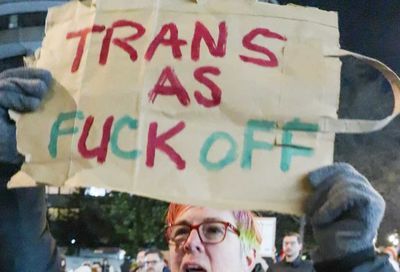Florida County Bans Book on Gay Penguins, Citing “Don’t Say Gay” Law

A county in Florida has banned three children’s books, including one about two gay male penguins who adopt a egg, claiming that the books run afoul of Florida’s “Don’t Say Gay” law.
Lake County Schools has banned And Tango Makes Three, an award-winning children’s book based on the true story of two gay male Central Park Zoo penguins who adopted an egg and raised the baby penguin hatched from it as their own.
The school system has also banned A Day with Marlon Bundo, a story about a rabbit — the pet of former Vice President Pence — who falls in love with another male rabbit, and In Our Mothers’ House, a book about a family being headed by a lesbian couple, according to Popular Information.
The justification for removing the three books from library shelves was that the books contain content prohibited by Florida’s “Parental Rights in Education” law — dubbed the “Don’t Say Gay” law — which prohibits “classroom instruction” in sexual orientation or gender identity, or “sexual instruction” in grades K-3, and requires that any material broaching those topics in older grades be “age appropriate” or “developmentally appropriate.”
None of the books have content that would be considered sexual, but administrators have defended the decision, arguing that any information about the LGBTQ community, including books with LGBTQ characters, is inappropriate for elementary school students.
Other counties have also barred LGBTQ-themed books from circulation, citing the “Don’t Say Gay” law. In Seminole County, the school district has yanked three books involving gender-nonconforming characters — Jacob’s New Dress, 10,000 Dresses, and I Am Jazz — from the shelves for content not deemed “appropriate” for grades K-3. The books will now only be available to 4th and 5th graders if a parent explicitly grants permission for their child to read the books, and appears in person to pick the books up from the principal’s office.
Similar bans on books containing LGBTQ characters have been removed from the shelves in Manatee County, just south of Tampa, citing the Parental Rights in Education Act.
The law is currently being challenged in federal court, with the state arguing that the lawsuit should be dismissed because the plaintiffs have no standing. But those behind the lawsuit claim that the law is vague in terms of the specific conduct it prevents, is arbitrarily enforced, and is unconstitutional, violating students’ and teachers’ free speech rights and right to equal protection under the law as administrators and teachers proactively engage in various types of censorship to avoid running afoul of the law.
The Florida Department of Education is currently in the process of developing guidance on how the law should be enforced, and has developed a training for librarians on determining which books are appropriate for inclusion in school libraries. According to documents unearthed by Popular Information, the administration of Florida Gov. Ron DeSantis (R) is encouraging librarians to adopt an expansive interpretation of the law’s provisions.
For example, the training does not inform librarians that the “Don’t Say Gay” law applies only to classroom instruction, and not to library books, instead advising librarians that “[t]here is some overlap between the selection criteria for instructional and library materials.” The training also claims that library books and instructional materials cannot include “unsolicited theories that may lead to student indoctrination.”
The training encourages librarians to remove books with LGBTQ themes from elementary school libraries, and instructs them to “err on the side of caution” when making decisions about which books to pull from the shelves. It tells librarians to consider “whether you as an adult would be comfortable reading [aloud] the material in person in a public meeting.”
While that last piece of advice is not rooted in the Florida law or federal law, such an interpretation has been embraced by right-wing organizations that have demanded similar bans of LGBTQ-themed books in their local school libraries. The “read aloud” provision appears to be a reference to young adult books like Gender Queer and Lawn Boy, among others, that contain descriptions of sexual activity that social conservatives have deemed to be “pornographic.”
In some school systems, such books have been removed from library shelves. But in other districts, the books have been returned to the shelves after committees of parents and teachers have determined that the passages containing sexual content — which parents have read aloud at school board meetings, often out of context — are incidental to the overall plot of the story, and that the books do not exist just to satisfy prurient interests.
Support Metro Weekly’s Journalism
These are challenging times for news organizations. And yet it’s crucial we stay active and provide vital resources and information to both our local readers and the world. So won’t you please take a moment and consider supporting Metro Weekly with a membership? For as little as $5 a month, you can help ensure Metro Weekly magazine and MetroWeekly.com remain free, viable resources as we provide the best, most diverse, culturally-resonant LGBTQ coverage in both the D.C. region and around the world. Memberships come with exclusive perks and discounts, your own personal digital delivery of each week’s magazine (and an archive), access to our Member's Lounge when it launches this fall, and exclusive members-only items like Metro Weekly Membership Mugs and Tote Bags! Check out all our membership levels here and please join us today!

























You must be logged in to post a comment.